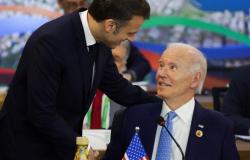Northvolt is more than ever on the brink of collapse. After announcing its placement under the protection of Chapter XI of the American bankruptcy law, the Swedish group indicated this Friday that its CEO Peter Carlsson was giving up his apron. “It’s the right time for me to pass the baton to the next generation of leaders”laconically commented the boss, who retains a role of “senior advisor” and a place on the board of directors. This former Tesla employee is thus letting go of the helm of the start-up he co-founded with much fanfare in 2016, with the ambition of becoming Europe's spearhead in the very strategic field of batteries for electric vehicles.
Electric cars: Europe's cold shower on the battery market
Today the party is over. Northvolt is now at stake for its survival. Weighed down by a debt of 5.84 billion dollars for only 30 million euros in liquidity, the industrialist hopes that his placement under “Chapter 11” will give him time to restructure. And above all, to raise the 1 to 1.2 billion dollars that it needs, according to its management, to relaunch. Will he get there? Not sure. Its bankruptcy filing reveals that its management has so far failed to find new investors.
« They saw too big »
Northvolt, of which Volkswagen is the largest shareholder with a 21% stake, has been going through a crossroads for months. Its staff, undoubtedly galvanized by the 15 billion dollars raised since its creation, is accused of having had its eyes bigger than its stomach. The former start-up has, in recent years, increased its mega-factory projects in Sweden, but also in Germany and Poland.
His ambition? Nothing less than mastering the entire production chain of electric batteries, from the manufacture of cathodes to recycling. But it was quickly overtaken by major execution problems.
“They thought too big,” judges Pierre Paturel, research director and automotive specialist at Xerfi. They tried the race to size, and came up against an industrial reality that was visibly very complicated. Instead of waiting to truly master their manufacturing processes in their first factory in Skelleftea, Northvolt undoubtedly made the mistake of launching the construction of several other gigafactories. »
BMW leaves the ship
Significant production delays especially proved devastating. “If they lack money, it is firstly because they cannot produce enough cells”insists Pierre Paturel. This is why some customers preferred to jump ship.
Scalded by delivery delays, BMW notably canceled a 2 billion euro order last May. For Northvolt, the blow is severe. Four months later, the group announced the elimination of 1,600 jobs out of 6,500, coupled with the freezing of production development in its flagship of Skelleftea.
Northvolt's choice to rely on NMC (nickel, manganese and cobalt) technology for its batteries is also often criticized, while the demand for LFP (lithium, iron and phosphate) batteries, less expensive but with lower energy density, is going to increase. crescendo. But according to Pierre Paturel, this in no way explains Northvolt's problems.
“In 2030, projections specify that in Europe, demand will be equitably shared between the NMC and the LFP”he emphasizes.
A warning signal for Europe
In his eyes, the argument of the slowdown in sales of electric cars on the continent, often cited to justify Northvolt's setbacks, is not admissible either. “This is a cover-up so as not to say that there are technical difficultiesadds Emmanuel Hache, economist at IFP Énergies nouvelles. Electric car sales are far from having collapsed. »
The torments of Northvolt constitute, in any case, a warning signal for Europe. The continent was counting on this player to compete, in the long term, with the Chinese champions CTAL and BYD, who dominate more than half of the world market. The EU's objective is clear: to acquire a certain sovereignty in this highly strategic area, since the battery represents 30% to 50% of the cost of an electric car. But Northvolt's difficulties could well chill investors, and therefore hamper the development of the sector.
« Europe must stop fumbling »
Emmanuel Hache blames the industrial policy of the Old Continent. “This episode is representative of Europe’s state of unpreparedness for this new technology”he snaps. While many gigafactory projects fail or are put on hold, the economist judges that Europe is now “caught in a vice between China and the United States ».
The two superpowers are doubling down on batteries, via enormous funding for their “Made in China 2025” programs and the Inflation Reduction Act. “Either Europe puts money in and substantially finances these types of companies, or we assume, from today, that electric vehicles will be Chinesehe says. But we have to stop fumbling like that. »






